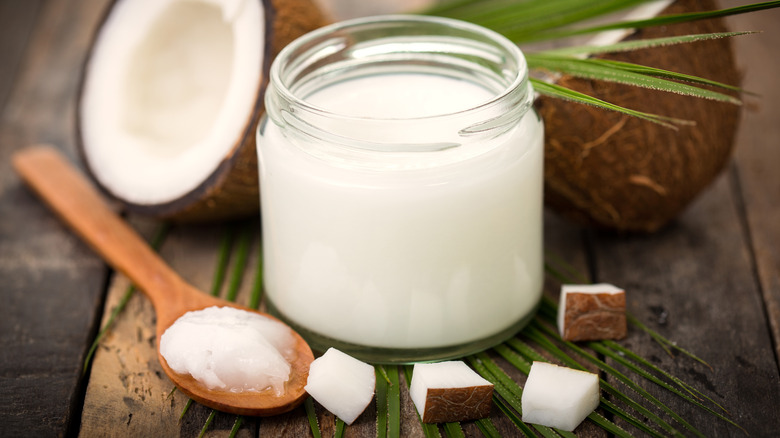The Downsides Of Coconut Oil
The many uses for coconut oil have been the buzz for years now as people have praised its benefits of softer skin, hair hydration, cooking, and even as an alternative for toothpaste. From its skin health effects, to weight loss properties, and its link to boosting cognitive function, coconut oil is more widely used now than ever before (via WebMD).
While there are proven health benefits to using this oil, there is also a downside you might not be aware of. You may have seen coconut oil promoted as a natural and healthy alternative to butter, or as a healthier fat option. The American Heart Association, however, disagrees, stating that coconut oil is a saturated fat, which is one of the bad fats, just like those contained in butter.
According to The Independent, 82% of the fat in coconut oil is saturated, which is actually more than butter, which has 63% saturated fat. The saturated fat levels in coconut oil also prove to be higher than some meat products, such as beef at 50% and pork lard at 39%.
Coconut oil is not as heart healthy as you may think
While the benefits of coconut oil are plentiful, there is a drawback, and it has been a bit controversial. According to Healthline, the saturated fats in coconut oil have been shown to decrease the bad cholesterol (LDL) in your blood, as well as increase the good cholesterol (HDL), which is why it's been touted by some as "heart healthy." Still, many experts agree that the tasty tropical oil should be eaten in moderation because too much saturated fat is simply not healthy for the cardiovascular system.
A diet high in saturated fats can increase LDL cholesterol, which in turn, increases the risk of heart disease (via Harvard Health Publishing). George Welch, M.D., a cardiologist at Manhattan Cardiology, tells Cosmopolitan that there is overwhelming evidence supporting the benefits of other oils that actually help lower LDL cholesterol. He states, "most cardiologists agree that [saturated fats] can lead to higher rates of cardiovascular disease."
A study published in the Nutrition Bulletin advises that coconut oil should not be consumed on a regular basis. While fats are an essential part of keeping the body healthy and working optimally, it's the good fats, monounsaturated fats and polyunsaturated fats, that you should be eating more of.


